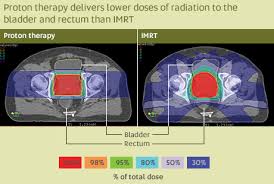
UNDER DEVELOPMENT
Proton Beam Radiotherapy (PBT): is the use of high-energy proton beams used
instead of conventional X-Rays to treat cancer. Protons are the ‘heavy’ particles, relative to electrons, with a positive charge and are one of the two constituants of atomic nuclei along with neutrons. It should be noted Proton Beam Therapy for prostate cancer is not routinely available.
One of the key characteristics of proton therapy, due to the size of the particles in the beam, is that they can be energised and programmed to stop at a very precise depth in the body rather than to continue to travel through normal tissue as X-rays do. The result is that the volume of normal tissue that is exposed to radiation is minimised.
For this reason, PBT is useful for treating tumors that have not spread and are near important organs in the body. Examples are, cancers near the brain and spinal cord. The other main use is for treating children because it lessens the chance of harming young healthy tissue that is still developing.
High energy PBT equipment is very expensive, therefore currently, there will be only 2 NHS centres providing high energy PBT in the UK, The Christie NHS Foundation Trust in Manchester, and University College Hospital NHS Trust (UCLH) in London. In both cases the installation is a the Varian ProBeam® high energy proton therapy system.
The Christie NHS proton beam therapy centre opened in Autumn 2018, and the first patient was treated in December 2018.
The other NHS centre is currently being built for University College London Hospitals with treatment due to begin in summer 2020. When complete the two centres will each treat up to 750 patients every year.
Prostate cancer treatment with PBT effectiveness studies
The evidence is far from conclusive
In a study comparing PBT and IMRT. The authors estimated that the incremental cost per quality-adjusted life year of PBT was US$63,578 (£42,400) for a man of 70 years and US$55,726 (£37,200) for a man of 60 years. A second study compared the cost effectiveness of PBT, Cyberknife and IMRT. PBT was more expensive and produced lower quality of life than Cyberknife. Compared with IMRT, proton beam therapy had a cost per quality-adjusted life year of US$36,344,000 (£24,230,000).
There are more recent studies using the latest pencil beam technology for focusing the radiation delivery that suggest
- Proton radiotherapy has minimal toxicity, therefore minimal side effects. Recently published studies describe severe toxicity of treatment in less than 1% of a large population of patients. When compared with published data on conventional (photon) radiotherapy, such toxicity is minimal and significantly lower.
- Unlike surgery, modern proton therapy has minimal risk of causing impotence, thus significantly enhancing patients’ quality of life.
However, PBT is not currently available on the NHS for the Treatment of prostate cancer as it is not perceived as delivering significantly better outcomes than IMRT, but is far more expensive even with less side effects.
However, there are systems at The Ruthford Cancer Centres in Bedlington, Newport, Thames Valley and shortly near Liverpool, which offer proton beam treatment to prostate cancer to private patients. These are the Ion Beam Applications’ high-energy proton beam therapy cyclotron called Proteus ONE. This system is small and compact and and much cheaper to buy and install.
There is a facebook group ‘men are talking’ dedicated to PBT for prostate cancer
One of the founders of Rutherford Heath was Professor Edward Karol Sikora, former head of the World Health Organisation’s cancer programme.
Finally, a Czech institute with a UK base, does offer PBT treatment for prostate cancer at a cost of around £35,000 (see link). This is cheaper than centres in the USA


Prostate matters is a not for profit organisation that is committed to providing free expert advice about prostate issues from leading Clinical Authorities
PROSTATE MATTERS
FOLLOW US
Copyright Disclaimer: We try to acknowledge copyright as appropriate. If we have used something without acknowledging copyright, this is inadvertent. Please let us know by emailing info@prostatematters.co.uk



